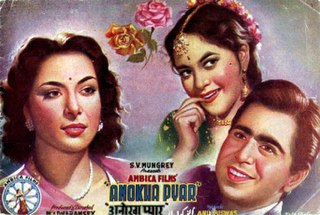
Shashi Kapoor was an Indian actor and film producer who is best known for his works in Hindi films. A recipient of several accolades, including four National Film Awards and two Filmfare Awards, he also featured in a number of English-language international films, particularly films produced by Merchant Ivory. The Government of India honoured him with the Padma Bhushan in 2011, and the Dadasaheb Phalke Award, in 2014, for his contribution to Indian cinema.

Ashok Kumar, was an Indian actor who attained iconic status in Indian cinema. He was considered the first big star of Hindi cinema as well as the first lead actor to play an anti-hero. He also became the first star to reinvent himself, enjoying a long and hugely successful career as a character actor. He was a member of the cinematic Ganguly family. He was honoured in 1988 with the Dadasaheb Phalke Award, the highest national award for cinema artists, by the Government of India. He also received the Padma Bhushan in 1999 for his contributions to Indian cinema.

Om Prakash Chibber was an Indian film actor. He was born in Jammu and was a well known character actor of Hindi Cinema. His most well-known movies are Gopi (1970), Hulchul (1971), Namak Halaal (1982), and Sharaabi (1984).

Sashadhar Mukherjee was an Indian filmmaker in Hindi cinema. He started his career with Bombay Talkies in the 1930s, and later established Filmistan Studio with Rai Bahadur Chunilal, Ashok Kumar and Gyan Mukherjee in 1943. In the 1950s, he went on to start his independent studio, Filmalaya. He is noted for films like Dil Deke Dekho (1959), Love in Simla (1960), Ek Musafir Ek Hasina (1962) and Leader (1964). He is part of the distinguished Mukherjee clan of Bollywood.

The Ganguly family is an Indian show business family active in Hindi cinema (Bollywood). It originates from the Ganguly brothers: Ashok Kumar, Anoop Kumar and Kishore Kumar (née Ganguly).

Munimji (transl. Clerk) is a 1955 Indian Hindi-language romantic comedy film starring Dev Anand and Nalini Jaywant, and directed by Subodh Mukherjee. The story idea was by Ranjan, screenplay was by Nasir Hussain and dialogues by Nasir Hussain and Qamar Jalalabadi. Pran played the villain in the film. It also starred Ameeta and Nirupa Roy. The team of Mukherjee, Nasir Hussain, Dev Anand and music director S.D. Burman later got together to produce another movie, Paying Guest, in 1957. The film was loosely adapted in Telugu as Inti Guttu (1958).

Dharam Karam is a 1975 Hindi drama film produced by Raj Kapoor and directed by Randhir Kapoor, who also stars as father and son in the film, respectively. The film also stars Rekha, Premnath and Dara Singh. The music is by R.D. Burman and the lyrics by Majrooh Sultanpuri, who received a Filmfare nomination as Best Lyricist for the hit song "Ek Din Bik Jayega." The song is played 4 times during the film, with playback singing by Kishore Kumar, Mukesh and Sushma Shrestha. Of the three of them, only Mukesh received a Filmfare nomination as Best Male Playback Singer for the song. According to one source, the film performed "Below Average" at the box office.

Salaakhen is a 1975 Hindi movie produced by Parvesh Mehra and directed by A. Salaam. The film stars Shashi Kapoor, Sulakshana Pandit, A. K. Hangal, Mehmood, Amrish Puri and Ramesh Deo. The film's music is by Ravindra Jain. The rights to this film are owned by Shah Rukh Khan's Red Chillies Entertainment.
Aap Beati is a 1976 Hindi film. Produced and directed by Mohan Kumar, the film stars Shashi Kapoor, Hema Malini, Ashok Kumar, Nirupa Roy, Premnath, Aruna Irani, Helen, Asrani, Sujit Kumar and Madan Puri. The film's music is by Laxmikant-Pyarelal.

Nalini Jaywant was an Indian actress who appeared in Hindi films in the 1940s and 1950s. Filmfare in their poll in the 1950s declared her the most beautiful woman in the movies. Actor Dilip Kumar described her "the greatest actress he ever worked with".

Samadhi is a 1950 Indian Hindi-language spy film directed by Ramesh Saigal. A box office success, the film was the highest earning film of 1950, earning an approximate gross of Rs. 1,35,00,000 and a net of Rs. 75,00,000.

Charitraheen is a 1974 Bollywood drama film directed by Shakti Samanta. The film stars Sanjeev Kumar and Sharmila Tagore. The film was on the program of the cinema S. Gabriel in Lourenço Marques, Mozambique in May 1975. It is a remake of Bengali movie Kalankito Nayak (1970) starrer Uttam Kumar, Sabitri Chatterjee and Aparna Sen.

Naukri is a 1978 Bollywood film directed by Hrishikesh Mukherjee. It was critically acclaimed and became an unexpected flop at the box office. However over the years, the film has been appreciated by the audiences in its screening in television and has gained a cult following over the years. Rajesh Khanna and Raj Kapoor starred in this movie, set in 1944–1947.

Dharmputra is a 1961 Hindi film directed by Yash Chopra based on a novel of the same name by Acharya Chatursen. This is Yash's second directorial venture. It was the first Hindi film to depict the partition of India, and Hindu fundamentalism. Produced by his elder brother B.R. Chopra, who was himself uprooted from Lahore, during the partition of India and established B.R. Films in Mumbai in 1956. The film dealt with issues of religious bigotry, fanaticism and communalism amidst the backdrop of the partition. Two years earlier, Yash Chopra had made his debut with Dhool Ka Phool (1959), steeped in Nehruvian secularism, wherein a Muslim brings up an "illegitimate" Hindu child and featured the classic song "Tu Hindu Banega Na Musalman Banega, Insaan Ki Aulaad Hai, Insaan Banega". The theme was reversed in this film as herein a Hindu family brings up an illegitimate Muslim child.

Anokha Pyar is a 1948 Indian Hindi language film. The film stars Dilip Kumar, Nargis, Nalini Jaywant in lead roles. The black and white romantic love triangle was directed by M. I. Dharamsey under the Ambika Films banner. The music was composed by Anil Biswas, who gave a then unknown young Lata Mangeshkar maximum songs to sing for the film. The rest of the cast included Sankatha Prasad, Mukri, Ved, Kesarbai, Habib and Sheikh.

Benazir is a Hindi film released in 1964, starring Ashok Kumar, Meena Kumari, Shashi Kapoor and Tanuja, directed by S.Khalil and music by Sachin Dev Burman.

Gyan Mukherjee was an Indian film director and screenwriter, who worked in Hindi cinema, best known for the hits Jhoola (1941) and Kismet (1943).

Rahi is a 1953 Hindi social drama film produced and directed by K. A. Abbas. The film was based on Mulk Raj Anand's novel "Two Leaves and a Bud" (1937), which was scripted by Abbas. It was produced as a bilingual in Hindi as Rahi and in English as The Wayfarer, under the Naya Sansar banner. Its screenplay was by Mohan Abdullah and V. P. Sathe and the cinematographer was Ramchandra. The film starred Dev Anand and Nalini Jaywant with Balraj Sahni, David Abraham Cheulkar, Achla Sachdev and Manmohan Krishan.

Jadoo (Magic) is a 1951 Hindi psychosocial melodrama film directed by A. R. Kardar. The story writers were S. N. Bannerji and Jagdish Kanwal, with dialogues by Zahur Raja and Bannerji. The music director was Naushad, with lyrics by Shakeel Badayuni. This was the second to last film in which Naushad was to be the music director for Kardar. After an association of fourteen films, Naushad composed one last time for Kardar in Deewana (1952). Prior to this Kardar had already approached composer S. D. Burman for Jeewan Jyoti (1953). A "Musical Pictures Ltd." presentation, the film starred Nalini Jaywant, Suresh, Shyam Kumar, Sharda, and Ramesh.


















